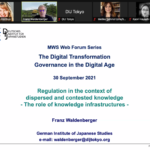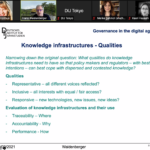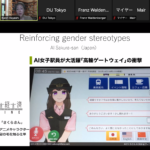Veranstaltungsort
Online (Zoom)
Anmeldung
This is a past event. Registration is no longer possible.
Please subscribe to our DIJ Newsletter to stay informed about our research activities, events, and publications:
Governance in the Digital Age
30. September 2021
Kaori HAYASHI (University of Tokyo)
Melike ŞAHINOL (OI Istanbul)
Franz WALDENBERGER (DIJ)
moderated by Harald KÜMMERLE (DIJ)
A video recording of this event is available on the DIJ YouTube channel
Abstracts and speakers
Kaori Hayashi
Toward a Gender-Equal Society in the AI Era: A Distant Goal for Japan?
In the Japanese public sphere we often encounter discriminatory expressions and stereotyped, derogatory images of women. They are, however, hard to regulate legally in light of the free speech principle stipulated by Article 21 of the Constitution of Japan. Like other major businesses, the media and information sector has only a small number of women at the management level and remains insufficiently attentive to the gender dynamics of the society. I contend that the problem of Japan, which ranked 120th out of 156 countries in Global Gender Gap Report, lies not only in the institutional systems, but also in the media culture that is uncritical, or even supportive, of misogyny and patriarchy. In this presentation, I introduce a new initiative „B’AI Global Forum“, set up within the „Institute for AI and Beyond“ at the University of Tokyo, that strives to create a more gender-equal media and information culture.
Kaori Hayashi is Professor of Media and Journalism Studies at the Graduate School of Interdisciplinary Information Studies, the University of Tokyo. She is Executive Vice President of the University of Tokyo in charge of global and diversity affairs, as well as Director of the B’AI Global Forum, which was set up within the Institute for AI and Beyond at the University of Tokyo. Her most recent English publications include „The Silent Public in a Liberal State: Challenges for Japan’s Journalism in the Age of the Internet“, in: The Crisis of Liberal Internationalism. Japan and the World Order, eds. Yoichi Funabashi and G. John Ikenberry, Brookings Institution Press, 2020, 325-358 and „Gendered power relations in the digital age: An analysis of Japanese women’s media choice and use within a global context“, in Feminist Media Studies (review accepted, in print).
Melike Şahinol
Digital Cultures of Health
This presentation addresses transformation processes in healthcare that run parallel to digitalization processes using biomedicalization as a theoretical framework, with special attention being paid to human enhancement technologies. Empirical examples are used to critically question how digital transformation in healthcare has led to empowerment (and for whom) and what new challenges have arisen as a result.
Melike Şahinol (Dr. rer. soc.) is a Senior Research Fellow at the Orient-Institut Istanbul and head of the research area „Human, Medicine and Society“. The focus is on the interdependencies of medical innovations, (body) practices and institutions, and corporeality of cyborgs from a Social Science and Technology Studies (STS) perspective. In her project „Additive Manufacturing: Enabling Technologies in the Childhood“ she analyses the development of 3D printed prosthesis for children and disability beyond the technological fix narrative. Şahinol led the founding of the Turkish Scholarly Network for Science and Technology Studies (STS TURKEY) and continues to provide contributions to the establishment of STS in Turkey.
Franz Waldenberger
Regulation in the context of dispersed and contested knowledge
The effectiveness of public regulation depends on the knowledge legislators and regulators can draw from. In modern societies, such knowledge is necessarily dispersed and contested. The presentation will first elaborate on how regulation tends to cope with dispersed and contested knowledge. It will then discuss how such coping strategies are influenced by the new challenges and opportunities caused by the digital transformation.
Franz Waldenberger is Director of the German Institute for Japanese Studies. He is on leave from Munich University, where he holds a professorship for Japanese Economy. His research focuses on the Japanese economy, corporate governance, and international management. He is editor in chief of the international peer-reviewed journal Contemporary Japan. His recent publications include The Digital Transformation. Implications for the Social Sciences and Humanities, DIJ, 2020 (co-edited with Harald Kümmerle) and Governance, Risk, and Financial Impact of Mega Disasters: Lessons from Japan, Springer 2019 (co-edited with Akiko Kamesaka).
This event is part of the MWS Web Forum Series on The Digital Transformation.



